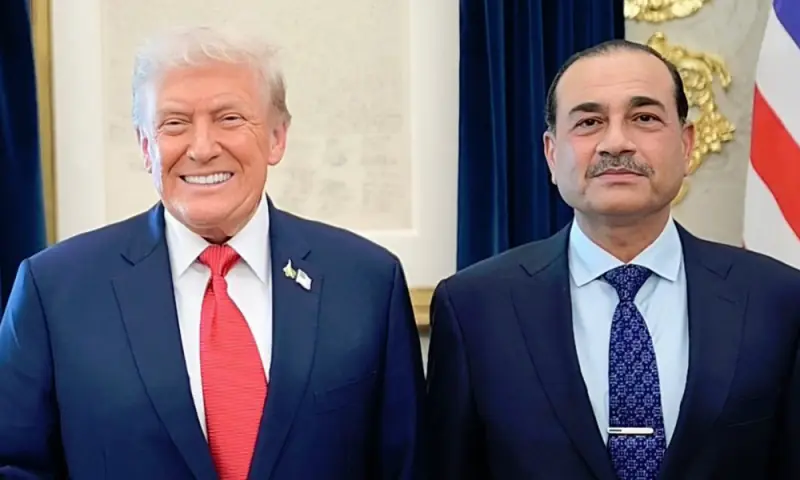Pakistan’s global profile is surging after US President Donald Trump embraced Army Chief Asim Munir, whom he calls a “great guy”. Trump claimed he “brokered a ceasefire” that prevented a South Asian catastrophe. The rapprochement has elated Islamabad, with officials calling the May clash an outright victory, reported Bloomberg on Friday.
The shift comes as Trump’s relationship with Indian Prime Minister Narendra Modi has deteriorated sharply, with the White House hitting India with some of the highest tariffs in the world.
US Congress report says Pakistan beat India
“A year ago, India was a central piece of the US’s strategy to work with allies and partners to pressure China, with Pakistan largely an afterthought. Now US-Pakistan relations are on the rise as Trump hits India with high tariffs, upending more than two decades of US policy aimed at improving relations with the world’s biggest democracy,” read the report.
“As Trump spars with Indian Prime Minister Narendra Modi, he’s embraced Munir, the formerly obscure commander elevated to a national hero in the wake of the India clash,” said Bloomberg.
“Trump now regularly praises Munir when he speaks about the India-Pakistan conflict, calling him a ‘great guy’ and putting him on equal footing with Modi.
“The shift in stance has revived Pakistan as a geopolitical power in the region,” it added.
However, the changing tides have unsettled a bipartisan consensus in Washington, it noted.
Kurt Campbell, US deputy secretary of state in the Biden administration, told Bloomberg Television that “almost all of our strategic interests lie with India” and the “wholesale collapse” of relations between Trump and Modi would likely “lead to some lasting damage”.
Others, including Nisha Biswal, partner at The Asia Group and former US assistant secretary of state for South and Central Asian Affairs during the Obama administration, argue that a healthy US-Pakistan relationship could also give the US “leverage over India”.
“Both relationships have to stand on their own merits,” she added.
“The extent to which the US can exert leverage and pressure on Pakistan, and has the relationship to do so in times of crisis, is an important aspect,” she said. “You don’t want a Pakistan that is impervious to US influence.”
Meanwhile, in Pakistan, Munir’s stature has surged following the May confrontation, with officials framing the clash as a success.
“We defended ourselves and we won,” said State Minister for Finance Bilal Azhar Kayani, according to Bloomberg. “But in addition to that, the way we have conducted ourselves diplomatically in a changing and fluid global landscape has been commendable.”
As per the report, the May clash created a “firmer alignment between Pakistan’s military and civilian leaders,” according to Jay Truesdale, chief executive at geopolitical risk consulting firm TDI and a former chief of staff at the US Embassy in Islamabad.
“The way the Americans intervened and the outcome that took place, the Pakistanis can claim that they had a victory, and this has further galvanised the unity of effort,” Truesdale said.
As per the report, Islamabad has moved quickly to prioritise areas of interest to Trump, including cryptocurrency and counterterrorism, while the US lowered tariffs on Pakistani goods to 19%, well below India’s.
Moreover, apart from the US, Pakistan has ramped up ties with Saudi Arabia, inking an economic pact with the kingdom last month, shortly after reaching a mutual-defence pact with the nation.
“Not only the Americans, but the world everywhere, they find in Pakistan right now a leadership that — despite all the challenges — is handling the affairs in a great manner,” General Ahmed Sharif Chaudhry, Pakistan’s top military spokesman, said in an interview in Islamabad.
However, “a challenge for Pakistan is whether it can trust Trump and balance relations with the US and China, Islamabad’s top supplier of weapons, infrastructure and aid,” noted the report.
“China has been a longstanding partner, so has the US,” Finance Minister Muhammad Aurangzeb said in an interview with the international media outlet. “They both know that we are well engaged on both ends.”
Meanwhile, the US is showing interest in Pakistan’s mineral wealth, with US Strategic Metals signing an MoU in September to develop rare earth resources.
As per the report, the deal came together after an August meeting with Munir with other business executives in Florida.
“We’d like this to become a political win for America,” said USSM commercial director Mike Hollomon.


